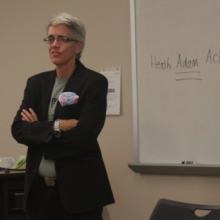college
The universities argued the measure was unlawful and would adversely affect their academic institutions.
Are we equipped to muster the political, moral, and spiritual resources necessary to sustain our republic?
Denny Burk, a professor at Boyce College, expressed an old strategy of Christian colleges to defend 'orthodoxy.'
Seita Scholars have a 30 percent graduation rate, compared with national averages of 8 percent for former foster children. Maddy Day, a former director of outreach and training for the center, remembers becoming aware of the success of the Seita Scholars program while she worked at a similar program at the University of Washington.

Photo by redcharlie on Unsplash
As parents, how can we navigate the tension between our moral ideals of justice and equality and our desire to give our own kids the best opportunities we can?
“A teacher once told me it would be better if I didn’t tell people I’m gay,” said Jed McDonald, a Pasadena City College student and former youth in foster care.
“I think she meant it as helpful advice because she wasn’t a mean teacher, but it didn’t feel that way,” McDonald said.

Image via WindNight/Shutterstock.com
Most importantly, I got to put my boys to bed most nights of their lives. Almost every night, we would say a prayer and goodnight with quick conversations about the day, the next day, or baseball. That’s why it was hard to turn off the bedside light when we came home — without being able to say goodnight.
The reality is that modern Christianity in the Americas was built upon the genocide of indigenous people, the theft and commodification of land, and the enslavement of black people. It wasn’t simply an ethical glitch of bad people with otherwise good theology. No. This was praxis, linked with liturgy, linked with worldview, and, beyond that, to imagination. Will you continue to believe that modern “Christianity” is essentially good but was simply misused by bad people? Or, will you have the unflinching courage to critically examine Christianity’s role in horrors, in inequality, even in your own alienation?

lastbackup / Shutterstock
A COUPLE OF YEARS AGO, while doing research on social privilege for an introductory ministry course, I came across an article titled “White Fragility.” Even a skim of the first few pages was enough to pique my excitement. In it, author Robin DiAngelo—an expert in multicultural education—describes in sociological detail a common set of defensive and destructive responses that people have when facing the reality of their own privilege.
I recognized each response she described from those my students had whenever I asked them simply to face—let alone begin to dismantle—the various forms of social privilege they each embody. Where, I began to wonder, could I squeeze this article into an already over-packed course syllabus? How could it best help us navigate the difficult issues we were trying to engage?
Emptying ourselves
Social privilege is a daunting topic to engage. When teaching it, I draw heavily on Peggy McIntosh’s now famous definition of its racial manifestation:
I have come to see white privilege as an invisible package of unearned assets that I can count on cashing in each day, but about which I was ‘meant’ to remain oblivious. White privilege is like an invisible weightless knapsack of special provisions, assurances, tools, maps, guides, codebooks, passports, visas, clothes, compass, emergency gear, and blank checks.
What McIntosh helps us see is that social patterns of privilege are maintained because people carry them about and use them while, at the same time, people are able to carry about and use their privilege because those social patterns are maintained. The effect is cyclical, and it happens without any of us being particularly aware of our own complicity in the system.
Society confers unearned gifts on people who embody particular privileged traits—straight, white, able-bodied, middle-class men, for example—while neglecting to confer them on others. This isn’t to say that people who embody more privilege are explicitly homophobic, racist, ableist, classist, or sexist. It doesn’t mean they don’t work hard for the goods they accumulate in life—of course, many do. It’s just that it feels perfectly natural to walk through an open door without ever noticing how it swings shut in the face of the equally hardworking genderqueer Latinx whose wheelchair wouldn’t even fit.

Image via ChameleonsEye / Shutterstock.com
I didn’t know whether to stop. I turned the corner and noticed you first, before I noticed the police cars and the flashing lights and your car crammed full of stuff. You were standing there, jeans and hoodie. Hands in pocket and hood over your head. It was cold and you did not have on a coat. I was in my warm car, and you were standing in the January cold.
Since all the political news is terrible and only getting worse, I decided to reflect on something very personal this week — about a great event that happened this weekend.

Image via Africa Studio/Shutterstock.com
According to the Washington Post:
“If some of those people in that community center had what I have in my back pocket right now …,” he said while being interrupted by louder cheers and clapping. “Is it illegal to pull it out? I don’t know,” he said, chuckling.
“I’ve always thought that if more good people had concealed-carry permits, then we could end those Muslims before they walked in,” he says, the rest of his sentence drowned out by loud applause while he said, “and killed them.”
“I just wanted to take this opportunity to encourage all of you to get your permit. We offer a free course,” he said. “Let’s teach them a lesson if they ever show up here.”
A Christian leader, at one of the most influential evangelical colleges, told a basketball arena full of 18–22 year olds to get guns and carry them around in their back pockets in order to take on any radical Muslims that might make their way down to Lynchburg, Va.

Image via Randy Miramontez / Shutterstock.com
As sexual assault on college campuses became a national conversation in the U.S., dozens of women came forward with stories that Bill Cosby sexually assaulted them — and in many cases, that he drugged and raped them.
In response, some colleges that awarded Cosby an honorary degree have rescinded the award. Fordham and Marquette were the first two to do it, but with Springfield College’s recent announcement this week that it was revoking the comedian’s honorary degree, that number has grown to 12.
Still, a majority of the schools that awarded him a degree — at least 60 — have not revoked the honor. Vulture contacted more than 40 of these schools and listed their responses on their site. Some colleges replied that they were currently having discussions about the matter, while others made statements similar to George Washington University’s:
“It has never been the university’s practice to rescind an honorary degree.”
AS LINUS ONCE pointed out, Charlie Brown could turn a wonderful thing like Christmas into a problem.
Well, America’s post-industrial economy, in which the children of middle-class families frantically compete for slices of a shrinking pie, has done Charlie Brown one better: Our culture has managed to turn children’s sports into a problem. More and more, the fun and games of bygone days are being displaced by a network of pay-to-play competitive club sports organizations—gated communities of the youth sports world that are marketed to middle-class parents as the only route to coveted college athletic scholarships.
Two sets of statistics tell the story. As of 2010, according to the Columbus Dispatch, youth sports organizations took in at least $5 billion per year. In addition, according to a 2013 National Association of Sports Commissions study reported in the Dallas Morning News, the travel industry associated with youth sports is worth another $7 billion a year. And all that money is being spent on fewer kids. According to the Wall Street Journal, participation of kids age 6 to 17 in the most popular U.S. team sports fell by about 4 percent between 2008 and 2012 while the population of 6-to-17-year-olds fell by only 0.6 percent.
Competitive youth sports is becoming an elite phenomenon. Kids whose families can afford it spend the year migrating from tournaments to training camps. Meanwhile, the majority of kids just give up and stay home to play video games.
RECENT YEARS HAVE witnessed a deluge of headlines such as “Jobs Become More Elusive for Recent College Grads” from Reuters and “For Recent College Grads, Recessions Equal Underemployment” from Inside Higher Ed—headlines that make even the most hearty college students experience heart palpitations. According to a 2014 analysis by the Federal Reserve Bank of New York, “the underemployment rate for 22-year-olds is about 56 percent, indicating that more than half of the people just graduating end up working in jobs that do not require a degree,” jobs for which they are overqualified.
To put this into perspective: I am a 22-year-old senior at a private Christian university. Of my close friends who graduated in the last year or two, the only ones who were able to find jobs in their fields were education and nursing majors.
Don’t get me wrong, I love liberal arts and feel grateful for the critical thinking skills, study-abroad opportunities, and philosophical discussions that attending a liberal arts school has afforded me. But learning in the same analysis that “only 40-to-45 percent of recent college graduates majoring in communications, liberal arts, business, and social sciences were working in jobs that required a degree” is troubling at best.
In addition, seven out of 10 college seniors are graduating with an average of $29,400 in debt due to rising tuition costs for an undergraduate education. The National Center for Labor Statistics found that in the past decade, the cost of “tuition, room, and board at public institutions rose 42 percent after adjustment for inflation.” The situation was a bit (though not much) better at colleges in the private not-for-profit group, like my own, where the average price rise was 31 percent.
Debt from college loans makes some men and women postpone joining a religious community, according to a survey of men and women professing final vows in a religious order.
Ten percent of those who professed final vows in 2013 had an average amount of $31,000 in college debt and the average length of delay was two years, according to “New Sisters and Brothers Professing Perpetual Vows in Religious Life: The Profession Class of 2013.” The annual survey was conducted by the Georgetown University-based Center for Applied Research in the Apostolate (CARA).
Read the entire survey here.
A California Christian university has asked a professor who was once its chair of theology and philosophy to leave after he came out as transgender.
Heather Clements taught theology at Azusa Pacific University for 15 years, but this past year, he began referring to himself as H. Adam Ackley. “This year has been a transition from being a mentally ill woman to being a sane, transgendered man,” he said.
Ackley, who is in his third year of a five-year contract at a school that does not use the tenure system, said university policies seem to be silent about transgender issues, except that “Humans were created as gendered beings.”
News bulletin to Michael Gerson's firstborn son, my firstborn granddaughter, and the maybe 3 million other kids starting college this year: Your parents will be OK!
Gerson, a Washington Post columnist, wrote a touching op-ed piece Monday about his son's departure. He's not alone — the article, "Saying goodbye to my child, the youngster," is all over Facebook. Assuming there are still teenagers who use Facebook, no doubt many of them have read it too.
Some of those college-bound teens may be concerned for their parents' sanity. Kids, it's OK to relax. Your parents are probably normal.
In January, I received a phone message from a friend of ours. She needed to talk with me, she said. About something.
Not long after, I got an e-mail from Cordera (not her real name), our friend’s daughter:
“I am writing to you because my family and I have run into a problem. This summer President Obama passed the Deferred Action for Childhood Arrivals [of undocumented immigrants]. Over a long course of paperwork and appointments with the USCIS, I was able to receive a work authorized social security card and employment card. [But] without a student visa, I was not able to file for a loan. A few weeks after my first attempt, I found a bank that would be able to grant me a student loan with a US citizen or permanent resident as the co-signer. My father's uncle offered to help but . . . he was denied the credit.”
She wanted us to co-sign for a private loan in the amount of $35,000 to cover her first year of college. My heart sank. We couldn’t co-sign. Or we wouldn’t. I wanted to discourage her because of unfavorable and variable rates, immediate repayment, and long-term consequences of excessive indebtedness. I spoke with her university’s financial aid officer who intoned piously that the cost of the university experience was but one factor to consider: Cordera needed to hold onto her dreams, despite the crippling price tag of those dreams.
Five weeks after accepting a free, 217-acre campus in western Massachusetts, a for-profit Christian university has walked away from the gift.
Grand Canyon University of Phoenix, Ariz. faced millions in unanticipated costs as it moved to open its first East Coast campus in Northfield, Mass., according to GCU President Brian Mueller. So rather than complete a property transfer from the billionaire Green family of Oklahoma, GCU decided to dissolve the deal.
"We were willing to make a $150 million investment, but we really had trouble with the city of Northfield," Mueller said. "Northfield was concerned that growing the campus to 5,000 students would alter the basic culture and the basic feel of the area."
The surprise development marks the second time in less than a year that plans to give away the free, newly renovated campus have collapsed.
The Greens, who bought the property in 2009 with plans to give it to a Christian institution, initially offered it to the C.S. Lewis Foundation to launch a C.S. Lewis College on the site. But fundraising efforts for the college fell short last year. In January, the Greens began soliciting new proposals, and in September named GCU the recipient.
The other finalist to receive the campus was the Southern Baptist Convention's North American Mission Board, which later withdrew.












